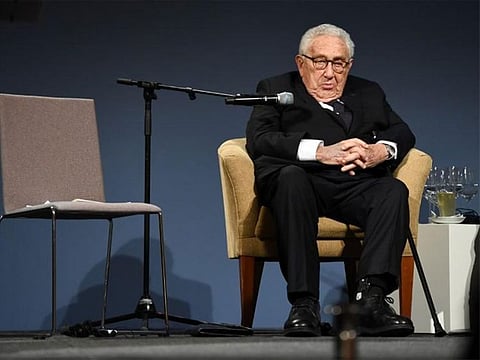Henry Kissinger’s guide to longevity
Veteran American diplomat, famed for his statecraft, recently turned 100

On May 27, my father, Henry Kissinger, celebrated his 100th birthday. This might have an air of inevitability for anyone familiar with his force of character and love of historical symbolism. Not only has he outlived most of his peers, eminent detractors and students, but he has also remained indefatigably active throughout his 90s.
Even the pandemic did not slow him down: Since 2020, he has completed two books and begun work on a third. He returned from the Bilderberg Conference in Lisbon earlier this week just in time to embark on a series of centennial celebrations that will take him from New York to London and finally to his hometown of Furth, Germany.
My father’s longevity is especially miraculous when one considers the health regimen he has followed throughout his adult life, which includes a diet heavy on bratwurst (sausage) and Wiener schnitzel (veil cutlet), a career of relentlessly stressful decision-making, and a love of sports purely as a spectator, never a participant.
How then to account for his enduring mental and physical vitality? He has an unquenchable curiosity that keeps him dynamically engaged with the world. His mind is a heat-seeking weapon that identifies and grapples with the existential challenges of the day. In the 1950s, the issue was the rise of nuclear weapons and their threat to humanity. About five years ago, as a promising young man of 95, my father became obsessed with the philosophical and practical implications of artificial intelligence.
As the Thanksgiving turkey was passed around in recent years, he would ruminate about the repercussions of this new technology, in ways that occasionally reminded his grandchildren of storylines in the Terminator films. While immersing himself in the technical aspects of AI with the intensity of an MIT graduate student, he infused the debate over its uses with his singular philosophical and historical insight.
The other secret to my father’s endurance is his sense of mission. Although he has been caricatured as a cold realist, he is anything but dispassionate. He believes deeply in such arcane concepts as patriotism, loyalty and bipartisanship. It pains him to see the nastiness in today’s public discourse and the seeming collapse of the art of diplomacy.
As a child, I remember the warmth of his friendships with people whose politics might have been different from his, such as Kay Graham, Ted Kennedy and Hubert Humphrey. Kennedy loved to play practical jokes that my father thoroughly enjoyed (including inviting Dad to his home office and claiming to have a mongoose hidden in a closet).
Kept the conversations flowing
Even as Cold War tensions persisted, Soviet Ambassador to the United States Anatoly Dobrynin was a frequent guest at our house. The two of them would occasionally play games of chess between negotiating issues affecting the entire planet. My father regular conversations with the Soviets helped de-escalate tensions at a time when the nuclear superpowers appeared to be on a collision course. If only such regular dialogue occurred between the top players in today’s global tensions.
Chess aside, diplomacy was never a game for my father. He practised it with a commitment and tenacity born of personal experience. As a refugee from Nazi Germany, he had lost 13 family members and countless friends to the Holocaust. He returned to his native Germany as an American soldier, participating in the liberation of the Ahlem concentration camp near Hannover. There, he witnessed the depths to which mankind can sink unconstrained by international structures of peace and justice. In June, we will return to Furth, where he will lay a wreath at the grave of his grandfather, who did not escape.
I know that no son can be truly objective about his father’s legacy, but I am proud of my father’s efforts to anchor statecraft with consistent principles and an awareness of historical reality. This is the mission he has pursued for the better part of a century, using his rare brain and unflagging energy to serve the country that saved his family and launched him on a journey beyond his wildest dreams.
Washington Post
David Kissinger is president of the television production company Conaco.



